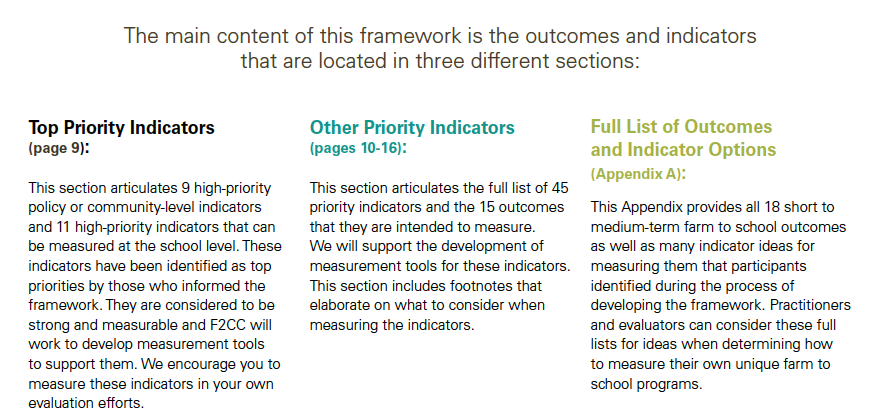But it can also be complex and tough to know where to start. F2CC, with the input of over 140 individuals from diverse sectors across the country, has developed the Farm to School Evaluation Framework for Canada to inform our own evaluation work and to give school communities, as well as researchers and policy makers, some guidance on how they can measure what matters.
This framework articulates 18 outcomes, 9 high-priority policy or community level indicators and 11 high-priority indicators that people have said that they want to see measured at the school level relating to 4 impact areas: Public Health, Education, Community Economic Development and the Environment. It then shares a full list of 45 priority indicators as well as other Indicator ideas that people wanting to evaluate their programs can select from.

We see this as the first step toward a common approach to measuring and reporting the impacts of farm to school in Canada.
This spreadsheet shares a list of the Framework’s indicators and outcomes.
Ideas for use: You might download it and add columns for comments and insights when you’re planning your own evaluation.
Outcomes & Indicators (Excel)Staff and student surveys to measure priority indicators.
Ideas for use: Adapt either of these survey templates to measure the framework’s priority indicators.
Staff and student surveys (Word) Staff and student surveys (PDF)This tool can be useful to track the ingredients used in your meal service each day/week and can help you calculate the percentage of local food you’re purchasing.
Food Tracking (Word) Food Tracking (Excel)Sharing Evaluation Tools to Support Farm to School Programs
Roots to Harvest: webinar | toolkit
Growing Chefs! Ontario: webinar | toolkit
Farm to School initiatives are being adopted with great enthusiasm across Canada because of their potential to improve student nutrition and food literacy while contributing to vibrant sustainable regional food systems, climate change mitigation and Indigenous food sovereignty. Farm to school programs use a cross-sectoral approach to aim to transform the systems that influence how students eat and learn about food at school.
Farm to School is a relatively new approach in Canada, and literature on the topic is limited as compared to the US. Farm to school efforts in Canada to date have focused on developing programs, and not as much on research.
In 2014, the US National Farm to School Network undertook a collaborative process to develop a cross-sectoral Evaluation Framework for farm to school to guide practice, research and policy development for the growing field. The results of this process included the articulation of a series of priority outcomes, measures and indicators that could be tracked at the program, research and policy levels, as well as the development of the US Benefits of Farm to School fact sheet that shares the positive impacts of farm to school that have been documented through research.
To date Canada has developed an emerging map of the Canadian farm to school landscape, released a handful of peer reviewed journal articles about various aspects of farm to school plus some grey literature as documented in Benefits of Farm to School: Evidence in Canada. We have also articulated emerging empirical evidence of how farm to school initiatives in Canada align with the new Canada’s Food Guide.
Given Canada’s unique context F2CC has seen that; there would be great benefit from the development of an Evaluation Framework for Farm to School in Canada to enable practitioners, researchers and policy makers to better articulate, track, measure and communicate the impacts of the farm to school approach.
The process to develop this framework was launched at F2CC’s May 2019 National Farm to School Conference and ended in April 2021. The bulk of the work to develop the framework took place from August 2020 – March 2021 using a modified Delphi method process.
The framework’s bilingual Delphi method process began by inviting individuals from a wide variety of sectors, including academics, government representatives, public health professionals, teachers and administrators, local food providers, community partners, and other representatives that are involved in farm to school or related initiatives across the country, to self-select to participate in the process. Those who registered were invited to contribute to 3 surveys and 4 thematic virtual discussions over the 8-month period.
More about the process is shared in Appendix B of the framework. You can also check out the full set of reference guides and reports from the Delphi method process here:
We plan to continue to collaborate with others to identify, adapt, develop and share useful evaluation tools including the following resources:
The development of this evaluation framework has been an initiative of the Farm to School: Canada Digs In! partnership:

Multilingual WordPress with WPML